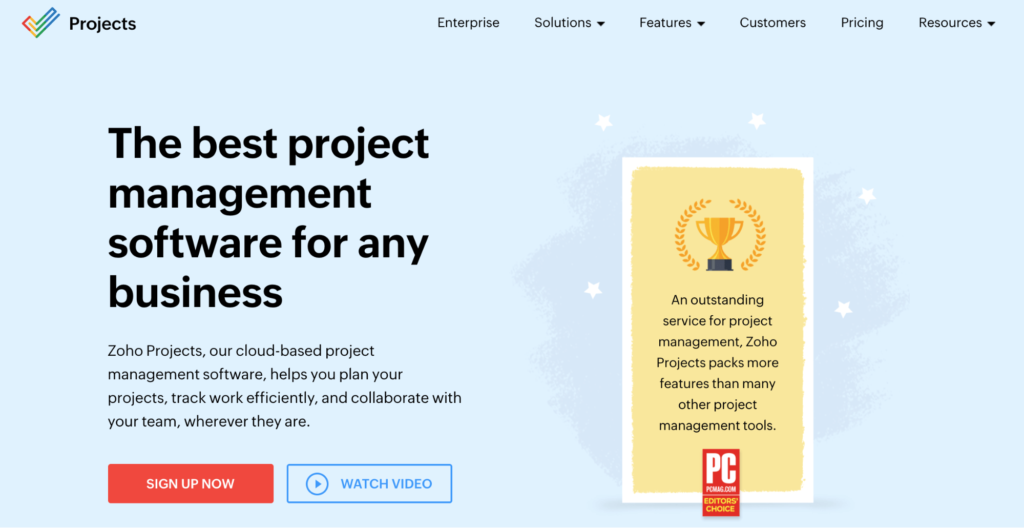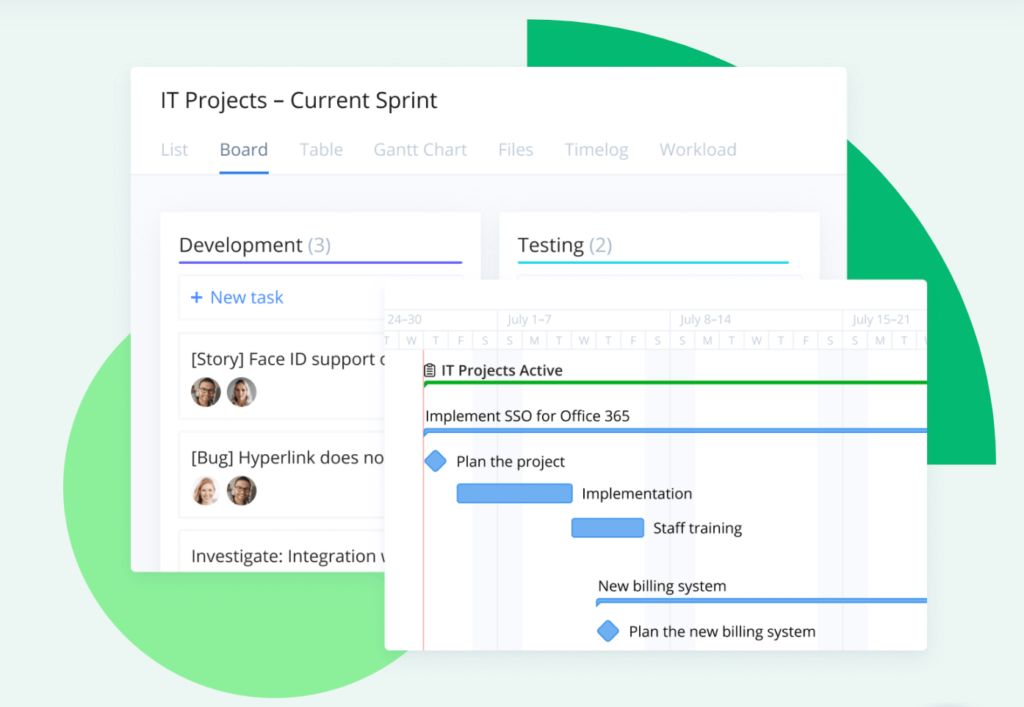Being a project manager is not an easy job. Managing teams, clients, and resources are just a few of the many responsibilities of a project manager.
To do this job effectively, you must sharpen specific skillsets.
Whether you’re interested in becoming a project manager or just want to improve your management skills, this guide will steer you in the right direction. We’ll dive deep into the tools that will make your life easier and discuss the must-have skills every project manager needs to master.
Once you’ve mastered these skills, you’ll become a more effective project manager and a better team leader.
What Are Project Management Skills?
Project management skills are the required competencies and traits someone needs to be a successful project manager.
The best project managers must be able to solve problems, allocate resources, manage budgets, assess risks, manage project timelines, and so much more. This all needs to be done while managing multiple personalities between team members, clients, and stakeholders. Not to mention planning and executing projects from start to finish.
This job gets much easier once you’ve recognized and improved your project management skills.
3 Tools to Improve Project Management Skills
Ready to take your project management skills to the next level? These tools can help make that possible.
#1 — Zoho Projects
Zoho Projects is an industry leader in the project management space. This cloud-based software is an all-in-one solution for project management and team collaboration. As a project management tool, Zoho Projects is packed with features to set you up for success. You’ll be able to communicate with your team more effectively and execute projects from start to finish. Regardless of the project scope or industry, this tool needs to be on your radar.
The Gantt charts are perfect for creating a project timeline. Zoho Projects also comes with tools for time tracking, project budgeting, resource utilization, and more. It has built-in chat and team communication features and even comes with valuable charts and reporting tools. There’s a free plan for up to three users, but most of you will want to sign up for the Premium package. This starts at $5 per user per month, and you can try it for free with a 10-day trial.
#2 — Wrike
Wrike is a powerful project management solution perfect for agile teams. It provides managers with complete control and visibility over all tasks and projects. You can even customize Wrike to meet your specific needs. From automation to streamlining workflows, the possibilities are seemingly endless. Another top reason to consider Wrike is its built-in collaboration features. This helps you eliminate useless meetings and status update chains. Instead, you can improve team communication with live editing, dynamic reports, real-time commenting, and more.
I like Wrike’s ability to share information with stakeholders as well. It’s easy to send them reports or updates directly within the platform. As a project manager, you can use Wrike to plan for the big picture. You’ll be able to identify problems and potential bottlenecks before they occur and ultimately avoid setbacks. Wrike has solutions for resource management, time tracking, scheduling, and everything else you could possibly need to manage projects more effectively. Plans start at just $9.80 per month, and you can try it free for 14 days.
#3 — Trello

Trello is used by over one million teams across the globe, making it one of the most popular project management tools on the market today. It stands out from other software due to its simplicity. If you’re new to project management, Trello has virtually no learning curve. It’s easy to deploy and makes it easy for your entire team to stay organized.
I like Trello because the Kanban-style boards for task management are perfect for managers that want a big-picture overview of the project. You’ll know exactly what’s complete and what still needs to be accomplished. Trello lets you communicate with your team without leaving the platform. You can assign tasks and mention team members on cards with any additional instructions. Trello isn’t quite as feature-rich as some other project management tools out there. But it gets the job done, especially for beginners. You can get started for free with unlimited members and up to ten project boards.
The Basics of Project Management Skills
There are dozens of hard skills, soft skills, and personality traits required to be a project manager. But from my experience managing projects and teams, the following are by far the most important.
Communication
Projects will fail if the leader can’t communicate effectively—it’s as simple as that. Project managers need to articulate exactly what they expect of their team, whether it be on a broad scale for project goals or related to specific tasks.
Many project managers make the mistake of assuming their team already knows what to do. Never make this assumption.
Some project management methodologies call for daily standup meetings with the entire team. The project manager needs to set the tone of these types of meetings. If you’re off-task, vague, and unclear, your team will follow suit. Make sure you’re approachable, so your team knows that they can ask you to clarify any questions or problems they might be faced with. Daily standups are a great way to ensure projects stay on track and your team members are being held accountable for their parts.
Aside from your team, you’ll also need to effectively manage communications with stakeholders, clients, or potentially executives within your organization. You must be able to keep them in the loop while being as concise as possible.
With so many teams working remotely, communication is more critical than ever before.
Leadership
Some people are natural-born leaders. Others are better at being told what to do as opposed to telling others what to do. Regardless of where you stand right now, you must learn to be an effective leader.
Project management is more than just task delegation, which is a huge process on its own. But it’s also about motivating teams and ensuring that everyone is doing their jobs.
Things happen. Team members argue. People show up late. Sometimes developers write subpar code. But the best project managers know how to solve these problems. Lead by example. Choose your battles wisely and know when it’s time to address something or if certain things are better left unsaid.
Use a leadership style that matches your personality. Learn how to assign tasks and tell people what to do without being a jerk about it. If you can gain the respect of your team, you’ll be a much more effective leader.
Negotiation
Being a great negotiator is an often overlooked aspect of managing projects. But in my experience, it’s definitely one of the essential skills for this position.
Negotiation isn’t just about getting the best price from a vendor or contractor, although that is undoubtedly part of the job. Project managers are often negotiating on a daily basis.
For example, let’s say you’re managing a software development project. You might have a client that’s constantly asking for changes or new features along the way. But these types of requests can drastically change the scope of a project.
The best negotiators know how to push back on some of these requests sensitively and tactfully. You want your client to feel happy while ensuring the project isn’t compromised.
Risk Management
Every project involves risk. Some will have significantly more risk than others.
It’s the project manager’s responsibility to plan for risk accordingly. Come up with contingency plans so that you know exactly what to do when specific issues arise.
Try to avoid single points of failure. For example, your team should be cross-trained on certain roles and responsibilities. If someone on the team gets sick, quits, or is otherwise unavailable, the project doesn’t grind to a halt.
In some cases, this may involve having an extra few people on the team from the beginning. While extra labor adds to the project’s cost, it’s something you’ll have to balance against the single point of failure risk.
Cost and Resource Management
One of the first parts of project planning is creating a budget. This is one of the many responsibilities that fall on the project manager.
You need to make sure that the budget is reasonable and then be able to control that budget throughout the entire execution of the project.
Costs and resources go hand-in-hand. Whether it’s referring to people, equipment, or both, you must be able to delegate these elements accordingly.
How do you assign tasks, resources, and responsibilities to your team in a cost-effective way without jeopardizing the project timeline? This is something that a project manager needs to ask themself every day.
Critical Thinking
Critical thinking and analysis is another project management skill that’s often overlooked. The best project managers know to take a step back and look at the big picture before making an important decision.
You’ll be faced with decisions daily. Some of these are more straightforward than others. But some choices require deep thought and analysis.
Today, project managers have the advantage of technology. Many project management tools will give you reports, analytics, and visual dashboards to help track your team’s performance. From budgeting to scheduling, these tools are extremely useful.
But those reports are useless if you don’t know how to analyze the data and turn them into action. That’s where critical thinking comes into the equation.
Scheduling and Time Management
Getting a project done and getting it done on time are two very different things. Project managers would have a much easier job if they had unlimited resources and unlimited time to finish a project—but that’s not the reality.
Before the project begins, you need to come up with a timeline and estimated completion date. You can break the project down into different phases and put small timelines on each one.
The timeline will be directly related to your cost and resources, two things that we discussed earlier. Then it’s a matter of delegating tasks that are a top priority. Consider using critical path management (CPM) as a methodology for planning your project schedule. This will help ensure that everything gets completed on time.
3 Tricks For Improving Your Project Management Skills
Mastering the project management skills listed above takes time. But there are a few ways that you can streamline this process by applying some quick tips. These simple actions can create a big impact, especially for project management beginners.
Trick #1: Use Technology to Your Advantage
Project managers today need to be tech-savvy. There are so many tools at your disposal that can make your job much easier.
Aside from the tools listed earlier in this post, check out our complete guide of the best project management software.
Software helps you delegate tasks, view the status of your project in real-time, allocate resources, create timelines, and make adjustments on the fly. It’s also the most effective way to communicate with your team, especially if they’re working remotely.
Embrace technology. Project management software can even help you manage costs and give you in-depth reports. Some software offers shareable dashboards that you can send to clients, stakeholders, and executives with a single click.
Trick #2: Stay Organized
You’d be surprised how much proper organization can improve your project management skills. This is especially true for those of you managing a portfolio of projects on a larger scale.
It’s easy to get confused and become overwhelmed with paper and tasks and deadlines. And it will quickly snowball and ultimately hurt the project. There are also psychological benefits to staying organized. You’ll feel more relaxed and perform better without getting flustered.
What’s the best way to stay organized? Refer back to the first trick. Use project management software to your advantage, and your life will be much easier. And find other tools that can help you stay organized and on top of everything. Perhaps utilizing your calendar synced to your email or finding a to-do list app that works for you will help.
Trick #3: Don’t Micromanage
Micromanagement is one of the fastest ways for projects to unravel. For starters, it gives your team the impression that you don’t trust them. It can also damage your relationship with the people you’re supervising.
The best project managers run autonomous teams. Let people be self-directing to an extent.
Rather than focusing on how things are getting done, prioritize the end result. If you’re unhappy with those results, you can step in and offer pointers. But constant status updates and advice along the way is an ineffective way to manage teams. Make yourself available for questions and clarification, but you should ultimately want your team to solve most problems on their own.
Implementing an effective project management methodology helps here too. Once the methodology is in place, people know how tasks will be accomplished and what’s expected of them. Then you can stay hands-off and focus your efforts on the big picture.
from Quick Sprout https://ift.tt/2QboeuM
via IFTTT


